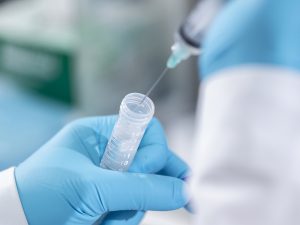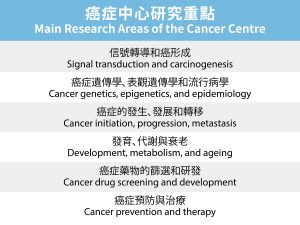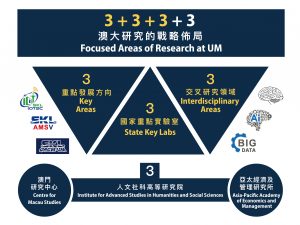The University of Macau (UM) is making rapid progress in scientific research. A few years ago, UM began to vigorously promote interdisciplinary research through a strategy that can be summarised as ‘highlighting characteristics’, ‘capitalising on advantages’, ‘building peaks’, and ‘strengthening cooperation’. The result is a‘3+3+3+3’ strategic research structure. In the Essential Sciences Indicators (ESI), UM is now ranked among the top 1 per cent in eight subjects, namely Engineering, Chemistry, Computer Science, Pharmacology & Toxicology, Materials Science, Clinical Medicine, Psychiatry/Psychology, and Social Sciences, General. Among the many research fields where UM excels, precision medicine for cancer treatment is an important one. In the cover story of this issue, we interview 17experts to learn about their breakthroughs in cancer research.
Interdisciplinary Approach to Cancer Research
Cancer is one of the leading causes of death worldwide. In a quest to develop cures for cancer, UM founded the faculty of Health Sciences (FHS) in 2013. FHS focuses on cancer research and the development of health products, in order to support the local community. FHS cooperates with other UM faculties and institutes, including the Faculty of Science and Technology (FST), the Institute of Chinese Medical Sciences (ICMS), theInstitute of Applied Physics and Materials Engineering(IAPME), and the Institute of Microelectronics (IME), in order to carry out interdisciplinary research on cancers commonly found in Macao. Scholars use state‑of‑the‑art technologies, such as microfluidic technology and nanotechnology, to enhance the effectiveness of cancer diagnosis and treatment.
To improve the quality of cancer research, UM focuses on tackling key issues in two areas: biomedical mechanisms and biomedical materials. FHS has identified eight research areas, one of them being precision cancer medicine. FHS Dean Prof Deng Chuxia, who is also the director of the Cancer Centre, leads his team to establish a frozen tissue bank and a live cell bank for the most common cancers found in Macao. FHS researchers also study tumour growth, metastasis, recurrence, and drug resistance mechanisms, in order to develop early cancer diagnosis methods, identify cancer driver genes, and screen for high‑efficiency drugs that can kill cancer cells. They also conduct research on carcinogenic mechanisms and preventive treatment for mutant genes of breast cancer, nasopharyngeal cancer, colorectal cancer, liver cancer, and lung cancer. For its part, ICMS carries out innovative research on how traditional Chinese medicine induces necroptosis of cancer cells, and how the natural compounds of traditional Chinese medicine help the immune system fight tumours.
In terms of biomedical materials, IME has developed a new digital microfluidic system to assist medical personnel to cultivate single cells and select cancer drugs. IAPME has established a world‑class nano‑bio‑optics research platform, through which it promotes collaboration with the university’s oncology research team, and accelerates the progress of research projects on carbon‑point cancer diagnosis and treatment.
A Top‑notch Cancer Research Team
Cancer is currently one of the ten leading causes of death in Macao, and this trend is expected to continue with the ageing of the population in the city. For this reason, it is imperative to strengthen cancer research in Macao. UM boasts leading experts specialising in different aspects of cancer research. They include Prof Deng Chuxia, Prof Shen Hanming, Prof Wang SanMing, Prof Zheng Wenhua, Prof Edwin Cheung Chong Wing, Prof Di Lijun, Prof Shim Joong Sup, Prof Henry Kwok Hang Fai, Prof Yuan Zhen, Prof Liu Tzu‑Ming, Prof Chen Xin, Prof Chen Xiuping, Prof Leo Lee Tsz On, and Prof Dai Yunlu.
UM’s cancer research team has already achieved innovative clinical research and aspire to create a multiple breakthroughs in the following areas: inhibiting breast cancer metastasis and recurrence, treating breast cancer with autophagy inhibitors, preventing cancer through large‑scale populational genetic testing, treating ophthalmic tumours with artemisinin and its derivatives, discovering a new mechanism for prostate cancer treatment, combining hormone replacement therapy with chemotherapy for ovarian cancer treatment, applying genetic theory in colorectal cancer treatment, reducing drug resistance in lung cancer by developing new inhibitory antibodies, developing a novel multifunctional drug for tumour photodynamic therapy, improving precision medicine for cancer treatment by using the multiphoton microscopy system to observe the microenvironment of tumours, inhibiting ovarian cancer metastasis with nanotechnology, destroying cancer cells at high temperatures by using nanoparticles as drug carriers, enhancing the effectiveness of cancer immunotherapy with natural compounds of traditional Chinese medicine, inducing necroptosis of cancer cells with Chinese medicine, and creating a digital microfluidics system for cancer drug screening.
Establishing an Interdisciplinary Research Platform
UM is currently applying to the Ministry of Education to establish a cutting‑edge research centre in the field of precision medicine for cancer treatment. FHS, FST, ICMS, and IAPME collaborate with one another to carry out interdisciplinary research in this field. The aim is to create an internationally leading centre for cancer immunology and precision medicine for cancer treatment in Macao and the Guangdong‑Hong Kong‑Macao Greater Bay Area, to meet the growing demand for cancer research and researchers in the next decade that will accompany the increase in life expectancy.
Earlier this year, UM established a joint cancer research centre with the Institute of Cancer and Basic Medicine, Chinese Academy of Sciences, in order to make full use of the strengths of both institutions in personnel, medical resources, and innovative research, and to support the pursuit of healthy living in Macao, the Greater Bay Area, and the rest of China. The centre tackles key scientific and technological issues in the prevention and treatment of cancers as well as in the development of cancer drugs. Scholars conduct UM’s cancer research world‑renowned oncology research and training centre.
The ‘3+3+3+3’ Research Structure
The four ‘3’s in the ‘3+3+3+3’ research structure refer to the university’s three state key laboratories(for Chinese medical sciences, analogue and mixed-signal very large scale integrated circuits, and internet of things for smart cities, respectively), three key research directions (precision medicine for cancer treatment, advanced materials, and regional oceanography), three interdisciplinary research fields (cognitive and brain science, artificial intelligence and robotics, and data science), and three research platforms for the humanities and social science (Institute of Advanced Studies in Humanities and Social Sciences, Centre for Macau Studies, and Asia Pacific Academy of Economics and Management). UM focuses on the world’s cutting edge academic issues and encourages interdisciplinary collaboration, and promotes the integration of modern technology in research in the humanities and social sciences.
Source: UMagazine Issue 22
Related articles:
1. A New Mechanism for Inhibiting Breast Cancer Metastasis and Recurrence
2. Treating Breast Cancer with Autophagy Inhibitors
3. Preventing Cancer Through Large‑scale Populational Genetic Testing
4. Artemisinin and Its Derivatives in the Treatment of Eye Cancer
5. A New Mechanism for Prostate Cancer Treatment
6. Combining Hormone Replacement Therapy with Chemotherapy for Ovarian Cancer Treatment
7. Applying Genetic Theory in Colorectal Cancer Treatment
8. A New Antibody for Reducing Drug Resistance in Lung Cancer
9. A Novel Multifunctional Drug for Tumour Photodynamic Therapy
10. Investigating the Dynamics of Melanoma Angiogenesis with Multiphoton in vivo Microscopy
11. Nanotechnology for Regulating Ovarian Cancer Metastasis
12. Nanoparticles Carry Drugs and Turn the Heat on Cancer Cells
13. Chinese Herbal Products Could Help Immune System Fights Tumours
14. Inducing Necroptosis of Cancer Cells with Chinese Medicine




